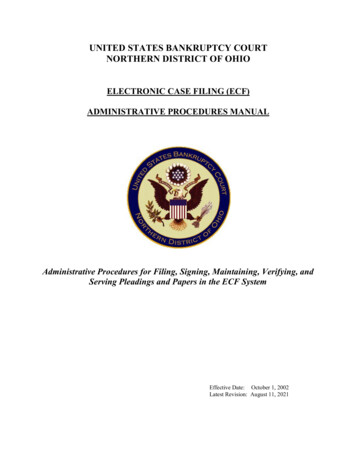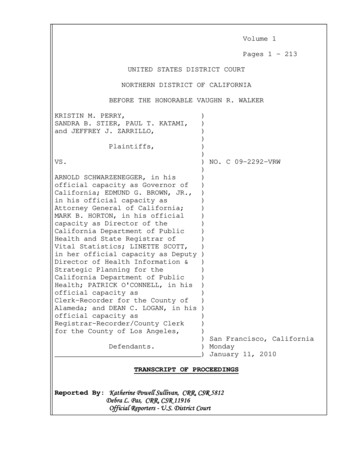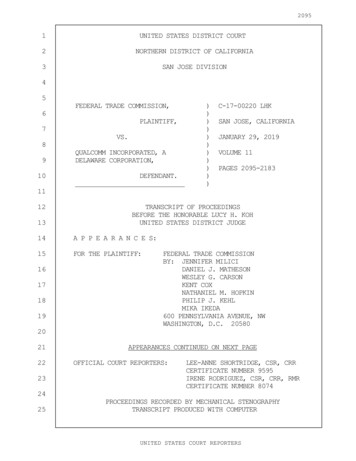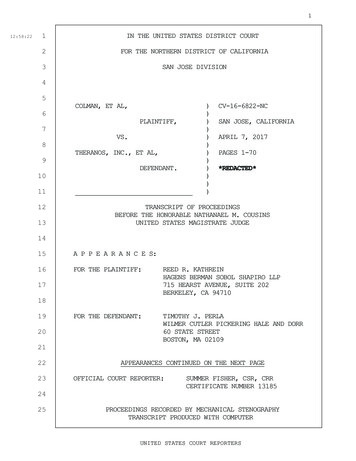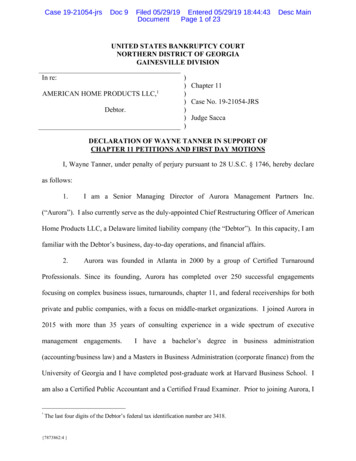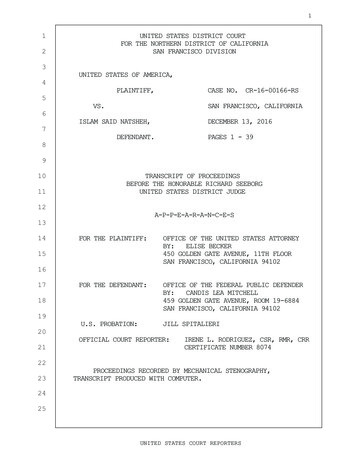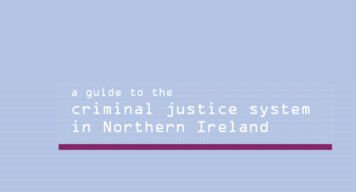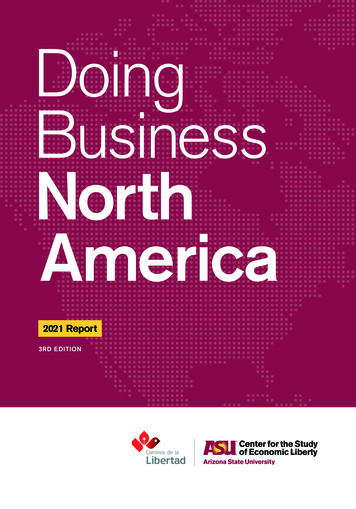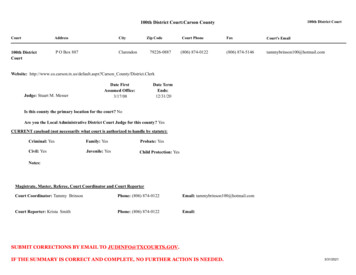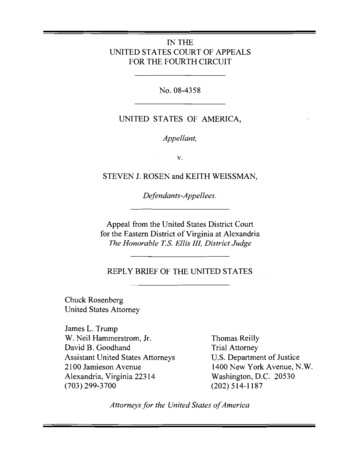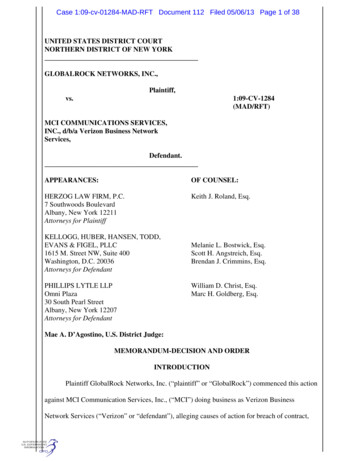
Transcription
Case 1:09-cv-01284-MAD-RFT Document 112 Filed 05/06/13 Page 1 of 38UNITED STATES DISTRICT COURTNORTHERN DISTRICT OF NEW YORKGLOBALROCK NETWORKS, INC.,Plaintiff,vs.1:09-CV-1284(MAD/RFT)MCI COMMUNICATIONS SERVICES,INC., d/b/a Verizon Business NetworkServices,Defendant.APPEARANCES:OF COUNSEL:HERZOG LAW FIRM, P.C.7 Southwoods BoulevardAlbany, New York 12211Attorneys for PlaintiffKeith J. Roland, Esq.KELLOGG, HUBER, HANSEN, TODD,EVANS & FIGEL, PLLC1615 M. Street NW, Suite 400Washington, D.C. 20036Attorneys for DefendantPHILLIPS LYTLE LLPOmni Plaza30 South Pearl StreetAlbany, New York 12207Attorneys for DefendantMelanie L. Bostwick, Esq.Scott H. Angstreich, Esq.Brendan J. Crimmins, Esq.William D. Christ, Esq.Marc H. Goldberg, Esq.Mae A. D’Agostino, U.S. District Judge:MEMORANDUM-DECISION AND ORDERINTRODUCTIONPlaintiff GlobalRock Networks, Inc. (“plaintiff” or “GlobalRock”) commenced this actionagainst MCI Communication Services, Inc., (“MCI”) doing business as Verizon BusinessNetwork Services (“Verizon” or “defendant”), alleging causes of action for breach of contract,
Case 1:09-cv-01284-MAD-RFT Document 112 Filed 05/06/13 Page 2 of 38fraud and gross negligence in connection with Verizon’s provision of telecommunication servicesto GlobalRock. Presently before the Court are three motions. Defendant moves for summaryjudgment and dismissal of plaintiff’s complaint and for summary judgment and an award ofdamages on defendant’s counterclaims pursuant to Fed. R. Civ. P. 56. (Dkt. No. 95). In thealternative, defendant moves to exclude the proposed expert testimony of Stu Sleppin and DavidJ. Malfara (Dkt. Nos. 94 and 96). Plaintiff has opposed the motions.BACKGROUND1Defendant is a provider of wholesale and retail long-distance telecommunicationsservices. Plaintiff is a prepaid calling-card provider selling calling cards that have a preset valueand function like debit cards. Customers who purchase the calling cards dial a toll-free access1Local Rule 7.1(a)(3) states:Summary Judgment MotionsAny motion for summary judgment shall contain a Statement of Material Facts. The Statement of Material Factsshall set forth, in numbered paragraphs, each material fact about which the moving party contends there existsno genuine issue. Each fact listed shall set forth a specific citation to the record where the fact is established. Therecord for purposes of the Statement of Material Facts includes the pleadings, depositions, answers tointerrogatories, admissions and affidavits. It does not, however, include attorney’s affidavits. Failure of themoving party to submit an accurate and complete Statement of Material Facts shall result in a denial of themotion.The opposing party shall file a response to the Statement of Material Facts. The non-movant’s response shallmirror the movant’s Statement of Material Facts by admitting and/or denying each of the movant’s assertionsin matching numbered paragraphs. Each denial shall set forth a specific citation to the record where the factualissue arises. The non-movant’s response may also set forth any additional material facts that the non-movantcontends are in dispute. Any facts set forth in the Statement of Material Facts shall be deemed admitted unlessspecifically controverted by the opposing party.Local Rule 7.1(a)(3)(emphasis in original).Defendant filed a Statement of Material Facts and plaintiff properly responded. Plaintiff also set forthadditional material facts. Defendant did not respond to these additional assertions in the reply submission. Thebackground set forth in this section is taken from: (1) defendant’s Statements of Material Facts and plaintiff’sresponses therein; (2) the exhibits and evidence submitted by defendant in support of the motion for summaryjudgment; and (3) the exhibits and evidence submitted by plaintiff in opposition to the motion for summary judgment.To the extent that the “additional facts” asserted by plaintiff in the Statement of Material Facts are supported by therecord, the Court will consider them in the context of the within motion. The facts recited are for the relevant timeperiod as referenced in the amended complaint.2
Case 1:09-cv-01284-MAD-RFT Document 112 Filed 05/06/13 Page 3 of 38number printed on the cards to reach GlobalRock’s calling card platform. The customer is thenprompted to enter a PIN number, also printed on the calling card, which allows GlobalRock’scalling card platform to authenticate the customer and ensure that the card has adequate funds.After the customer is authenticated, plaintiff is prompted to enter the destination number (thenumber of the person that the customer is trying to call). Plaintiff’s calling card platformdetermines what rate will apply to the call and whether any surcharges will be imposed. Thecalling card platform also determines which outbound carrier plaintiff should send the call to fordelivery to its destination (in telecommunications terms, “terminate” the call). This determinationis made based on the least-cost routing process. This process identifies the possible carriers andsorts the carriers in an attempt to place the call through the carrier that will charge the lowestprice. As the call progresses, plaintiff’s calling card platform deducts money from the card untilthe call ends or until the fund’s on the card are depleted.Telecommunications Services AgreementIn 1999, plaintiff’s predecessor-in-interest and defendant’s predecessor-in-interest enteredinto a contract, the Telecommunications Services Agreement (“TSA”). The TSA governedplaintiff’s purchase of wholesale services from defendant. The TSA included attachmentsdescribing the specific services that GlobalRock ordered from defendant and setting forth therates and terms applicable to those services. One of the service-specific attachments is entitled,“Attachment for Access Based Billing Carrier Origination Service.” This attachment governedthe origination service (inbound toll-free service) that GlobalRock ordered from Verizon. Thatorigination service enabled plaintiff’s customers to dial a toll-free number in order to beconnected to plaintiff’s calling card platform. Other service-specific agreements entitled,“Attachment for Access Based Billing Carrier Termination Service” and “Attachment for Carrier3
Case 1:09-cv-01284-MAD-RFT Document 112 Filed 05/06/13 Page 4 of 38IP Termination Service”, governed termination service (outbound service). Both types oftermination service enabled plaintiff to pass calls from its calling card platform to Verizon fordelivery to the local telephone company (or wireless carrier) service the number that the callingcard user was trying to reach.In 2003, the parties’ predecessors-in-interest entered into a contract called the DigitalServices Agreement (“DSA”) that governed plaintiff’s purchase of digital services from Verizon.Information DigitsTelephone companies create networks and transmit a variety of information that enablesthe companies to complete telephone calls and then bill for them. Switches, which are computersthat route calls through a telephone network, record the information so that it can later be used forbilling purposes.Call-signaling information is typically transmitted by Signaling System No. 7 (“SS7").One field of data in an SS7 message is Information Digits. Information Digits are two-digit codesthat provide information about the equipment used to originate the telephone call; for example,whether the call was placed from a land line, payphone or wireless phone. The local telephonecompany that originates the call generates the Information Digits that are placed in the SS7message. If the originating carrier places an incorrect value in the Information Digits field of anSS7 message, that value is passed to the subsequent carriers.GlobalRock uses an older signaling method called Multi-Frequency signaling (“MF”).MF signaling occurs in-band (on the same network that carries the telephone call). MF signalinguses different, and fewer, data fields than SS7 signaling. The MF signals that GlobalRockreceived from defendant had three fields of information: Automatic Number Identification(“ANI”), Dialed Number Identification Services (“DNIS”) and Information Digits.4
Case 1:09-cv-01284-MAD-RFT Document 112 Filed 05/06/13 Page 5 of 38New York State Gross Tax ChargesParagraph 5(b) of the TSA provides that GlobalRock “shall pay” for “any applicablefederal, state or local use, excise, gross receipts, sales and privilege taxes, duties, fees or similarliabilities whether charged to or against [Verizon Business] or [GlobalRock] because of theSwitched Services furnished to [GlobalRock,]” unless GlobalRock provides Verizon Business“with an appropriate exemption certificate.”Beginning in 2006, defendant began invoicing plaintiff for New York State gross receiptstax surcharges on certain services that defendant provided to plaintiff. Plaintiff disputed theapplication of the charges and refused to pay. On or around June 16, 2006, plaintiff recognizedthat it needed the assistance of a tax attorney to confirm whether the New York State grossreceipts tax surcharges were properly applied to the services it received from defendant andwhether an exemption certificate was required. On or around August 16, 2006, plaintiff wasrepresented by independent tax counsel.In April 2008, plaintiff and defendant entered into a settlement agreement resolving theirdispute about the tax receipts charges. Plaintiff consulted with tax counsel before entering intothe agreement. As part of the settlement agreement, plaintiff released all claims against defendantrelating to the disputed tax charges. As consideration, defendant credited plaintiff 116,180.02and plaintiff paid defendant 128,135.00.Invoices and Demands for PaymentThe TSA and DSA required plaintiff to pay all undisputed charges within thirty days ofthe date of each invoice. The TSA provided that, if plaintiff did not pay all undisputed charges onor before the due date, a late fee of 1.5% would apply. Both the TSA and DSA provided that ifdefendant denied plaintiff’s disputes in writing, the disputed amounts would become due and the5
Case 1:09-cv-01284-MAD-RFT Document 112 Filed 05/06/13 Page 6 of 38contractual late fees would apply to those amounts.2On October 1, 2009, defendant issued an invoice to plaintiff for services provided underthe TSA during the month of September 2009 for account number 2100113660. The invoicecontained charges of 769,324.22. Of these charges, 177,079.22 was for origination service.Plaintiff did not pay any portion of the charges. Plaintiff did not dispute any of theaforementioned invoice charges. On October 1, 2009, defendant issued an invoice to plaintiff forservices provided under the TSA during the month of September 2009 for account number2100116744. The invoice contained charges of 149,250.76. Plaintiff did not pay any portion ofthe charges. Plaintiff did not dispute any of the aforementioned invoice charges. On October 1,2009, defendant issued an invoice to plaintiff for services provided under the DSA with chargesof 2,373.51. Plaintiff did not pay any portion of the charges. Plaintiff did not dispute any of theaforementioned invoice charges.On November 1, 2009, defendant issued an invoice to plaintiff for services provided underthe TSA for October 2009 for account number 2100113660. This invoice contained charges of 928,860.17. Of these charges, 173,567.72 were for origination service. Plaintiff did not payany portion of the charges. On November 1, 2009, defendant issued an invoice to plaintiff forservices provided under the TSA for account number 2100116744 for October 2009. The invoicecontained charges of 158,162.26. Plaintiff did not pay any portion of the charges. On November1, 2009, defendant issued an invoice to plaintiff for services under the DSA with charges of 1,820.73. Plaintiff did not pay any portion of the charges.On November 2, 2009, defendant sent a letter to plaintiff requesting that plaintiff pay thepast-due, undisputed balance of 1,423,897.88 on the invoices issued by defendant on September2Plaintiff admits that the language in the TSA and DSA provide as such, however, plaintiff disputes that thiswas the actual practice between plaintiff and MCI.6
Case 1:09-cv-01284-MAD-RFT Document 112 Filed 05/06/13 Page 7 of 381, 2009 and October 1, 2009. The letter demanded payment of the undisputed portions of the tworecent sets of invoices. Defendant did not include any demand for payment on disputed amountsand did not include any amounts that were more than 90 days overdue. Defendant notifiedplaintiff that if it did not pay the charges in quesition within five days, defendant would“terminate all telecommunications services currently being provided by Verizon Business and anyof its affiliates, to [GlobalRock] on or after 12:00 Noon, CST, November 9, 2009". On November16, 2008, plaintiff filed the within lawsuit.On December 1, 2009, defendant issued an invoice to plaintiff for services provided underthe TSA for November 2009 for account number 2100113660. The invoice contained charges for 518,924.58. Of those charges, 53,320.44 was for origination service. On December 1, 2009,defendant issued an invoice to plaintiff for services provided under the TSA for the month ofNovember 2009 for account number 2100116744. The invoice contained charges of 115,530.28.Plaintiff did not pay any portion of the charges. On December 1, 2009, defendant issued aninvoice to plaintiff for services under the DSA with charges of 2,226.10. Plaintiff did not payany portion of the charges.On January 31, 2010, plaintiff filed a written dispute challenging 17,181.90 of theinvoiced charges relating to the November 2009 invoice to plaintiff for services provided underthe TSA for October 2009 for account number 2100113660. On February 10, 2010, plaintiffreceived written notice that defendant denied the dispute. On February 23, 2010, plaintiff filed awritten dispute challenging a portion of the December 2009 invoice on account numbers2100113660 and 2100116744. Plaintiff disputed 4,336.41 in origination charges and 1,916.54in termination service charges. On March 8, 2010, plaintiff received written notice that defendantdenied this dispute.7
Case 1:09-cv-01284-MAD-RFT Document 112 Filed 05/06/13 Page 8 of 38Verizon terminated all telecommunications services that it was providing to GlobalRockunder the TSA and DSA after GlobalRock failed to pay the past-due, undisputed chargesdemanded in the November 2009 letter. After Verizon terminated service to plaintiff, plaintiffcontinued providing its prepaid calling card services relying on other carriers, including Level 3Communications, to provide the origination and termination services that plaintiff had previouslypurchased from defendant.Amended ComplaintPlaintiff asserts eight causes of action against defendant alleging breach of contract, grossnegligence, failure to negotiate in good faith and fraud. Plaintiff also seeks an order declaring thesettlement agreement unenforceable. Specifically, plaintiff asserts a claim for damages as topayphone-specific Information Digits claiming that defendant delivered calls that originated frompayphones but did not contain pay-phone specific Information Digits in the call signalinginformation. Plaintiff argues that it was unable to apply a surcharge that it imposes on payphoneoriginated calls.3 Plaintiff also asserts a claim as to wireless-specific Information Damages butthe parties dispute the measure of damages on that claim. Plaintiff also claims that it sustained 423,340.87 in damages due to the fact that defendant improperly classified interstate calls asintrastate. The damages represent the difference between the intrastate rate that plaintiff wascharged and the interstate rate that plaintiff claims it should have been charged. Plaintiff did notpay defendant the amount referenced above and has admitted that it is not seeking to recover thatamount. Plaintiff also asserts claims based upon incomplete calls but the parties dispute therelevant facts surrounding that issue.Defendant filed an answer and asserted counterclaims for breach of contract.3Plaintiff also claims that it incurred additional damages including amounts paid in settlement of litigation topayphone providers and the costs associated with litigating those actions.8
Case 1:09-cv-01284-MAD-RFT Document 112 Filed 05/06/13 Page 9 of 38Procedural HistoryIn February 2010, defendant filed a motion to dismiss portions of the amended complaintas it related to the New York State tax charges, and also sought dismissal of GlobalRock’s fraudclaims, alleging that the claims fail to satisfy the heightened pleading requirements of Rule 9(b).In November 2010, Chief Judge Gary L. Sharpe issued an Order denying defendant’s motion.With respect to the tax charges claims, “GlobalRock alleged that it was fraudulently induced toenter into the agreement; that there was a lack of ‘equal bargaining power’ between the parties innegotiating the agreement; that the agreement was procured through economic duress; and thatthe agreement was unconscionable.” The Court held, “[w]hile Verizon offers admittedlycompelling arguments in this regard, and while the counter-arguments asserted by GlobalRockwill likely be insufficient to avoid summary judgment, the court permits the challenged portionsof the amended complaint to survive at this juncture and denies Verizon’s motion to dismiss as tothis issue.” (Dkt. No. 37). With respect to the fraud claims, the Court found that the allegationswere sufficiently particular to provide fair notice and denied that portion of the motion.DISCUSSIONDEFENDANT’S MOTION FOR SUMMARY JUDGMENTDefendant moves for summary judgment and dismissal of plaintiff’s amended complaint.In addition, defendant moves for summary judgment on the counterclaims and an award of 4,351,610.13 in damages.I.Summary Judgment StandardA court may grant a motion for summary judgment only if it determines that there is nogenuine issue of material fact to be tried and that the facts as to which there is no such issuewarrant judgment for the movant as a matter of law. See Chambers v. TRM Copy Ctrs. Corp., 439
Case 1:09-cv-01284-MAD-RFT Document 112 Filed 05/06/13 Page 10 of 38F.3d 29, 36 (2d Cir. 1994) (citations omitted). When analyzing a summary judgment motion, thecourt "'cannot try issues of fact; it can only determine whether there are issues to be tried.'" Id. at36-37 (quotation and other citation omitted). Moreover, it is well-settled that a party opposing amotion for summary judgment may not simply rely on the assertions in its pleading. See CelotexCorp. v. Catrett, 477 U.S. 317, 324 (1986) (quoting Fed. R. Civ. P. 56(c), (e)).In assessing the record to determine whether any such issues of material fact exist, thecourt is required to resolve all ambiguities and draw all reasonable inferences in favor of thenonmoving party. See Chambers, 43 F.3d at 36 (citing Anderson v. Liberty Lobby, Inc., 477 U.S.242, 255 (1986)) (other citations omitted). Where the non-movant either does not respond to themotion or fails to dispute the movant's statement of material facts, the court may not rely solelyon the moving party's Rule 56.1 statement; rather, the court must be satisfied that the citations toevidence in the record support the movant's assertions. See Giannullo v. City of N.Y., 322 F.3d139, 143 n.5 (2d Cir. 2003) (holding that not verifying in the record the assertions in the motionfor summary judgment "would derogate the truth-finding functions of the judicial process bysubstituting convenience for facts").II.AffidavitsIn opposition to defendant’s motion, plaintiff submitted affidavits from Ivan Danilov(“Danilov”) and David Malfara (“Malfara”). Defendant argues that both affidavits are improperand should not be considered by the Court in the context of the motion for summary judgment.4Local Rule 26.3 provides:Production of Expert Witness Information4Defendant filed a separate motion to exclude Malfara’s reports and testimony (Dkt. No. 96). As such, theCourt will discuss defendant’s objections to Malfara’s affidavit infra.10
Case 1:09-cv-01284-MAD-RFT Document 112 Filed 05/06/13 Page 11 of 38There shall be binding disclosure of the identity of expert witnesses.The parties shall make such disclosure, including a curriculum vitaeand, unless waived by the other parties, service of the expert's writtenreport pursuant to Fed. R. Civ. P. 26(a)(2)(B), before the completionof discovery in accordance with the deadlines contained in theUniform Pretrial Scheduling Order or any other Court order. Failureto comply with these deadlines may result in the imposition ofsanctions, including the preclusion of testimony, pursuant to Fed. R.Civ. P. 16(f). If a party expects to call a treating physician as awitness, the party must identify the treating physician in accordancewith the timetable provided in the Uniform Pretrial Scheduling Orderor other Court order.N.Y.N.D.L.R. 26.3.Fed. R. Civ. P. 37(c)(1) provides, “If a party fails to provide information or identify awitness as required by Rule 26(a) or (e), the party is not allowed to use that information . . .unless the failure was substantially justified or is harmless.” “The purpose of Rule 37(c)(1) is toprevent the practice of ‘sandbagging’ an opposing party with new evidence.” Ebewo v. Martinez,309 F.Supp.2d 600, 607 (S.D.N.Y. 2004). In assessing whether to preclude an expert's report,courts should consider: (1) the party's explanation for the failure to comply with the discoveryorder; (2) the importance of the testimony of the precluded witness; (3) the prejudice suffered bythe opposing party as a result of having to prepare to meet the new testimony; and (4) thepossibility of a continuance. See Patterson v. Balsamico, 440 F.3d 104, 117 (2d Cir. 2006). "It[is] an exceedingly simple, perfunctory task to give notice of witnesses as required by Rule26(a)(1)(A)(i) but one which was important to permit defendants to meet [the expert's]testimony." Kullman v. New York, No. 07-CV-716, 2009 WL 1562840, at *8 -9 (N.D.N.Y. May20, 2009) (citing Reilly v. Natwest Mkts. Group Inc., 181 F.3d 253, 268–69 (2d Cir. 1999)).On March 31, 2011, plaintiff served a Rule 26(a)(1) disclosure and included the names ofpossible witnesses: (1) Sleppin Stu, GlobalRock President; (2) Alexi Archinov, Consultant; (3)Bob Teeman, Telecom Switching, Inc.; and (4) Pete Golomb, EZ Call, Inc. Plaintiff also stated:11
Case 1:09-cv-01284-MAD-RFT Document 112 Filed 05/06/13 Page 12 of 38GlobalRock reserves the right to identify other individuals: at MCIand Verizon; at the New York State Department of Taxation andFinance; at Billing Concept; at other telecommunications carriers,including but not limited to those interconnecting with or deliveringtraffic to or from MCI; and at other entities who may also havediscoverable information that GlobalRock may use to support itsclaims or defenses.On June 14, 2012, United States Magistrate Judge Randolph F. Treece held a discoveryhearing and issued an Order which stated, inter alia, that all discovery, other than expertdiscovery, had been completed. With respect to expert discovery, the Court permitted the partiesto conduct additional expert depositions and afforded the parties the opportunity to exchangeadditional expert reports. The Court reset the discovery deadline for August 31, 2012. (Dkt. No.84). On December 28, 2012, plaintiff filed opposition to defendant’s summary judgment motionand included an affidavit from Ivan Danilov and an affidavit from David Malfara dated December28, 2012. (Dkt. No. 101).Defendant contends that plaintiff failed to identify Danilov as either a fact witness orexpert witness during discovery and thus, his affidavit must be disregarded. Plaintiff respondedto the argument in a sur-reply and set forth several arguments in support of the affidavitincluding: (1) it became necessary to identify Danilov because plaintiff’s expert, Alexi Archinov(“Archinov”), recently became unavailable having relocated to Russia; (2) that Danilov assistedArchinov in his data processing and bill review and relied upon the same information in preparinghis calculations; (3) Danilov was only “asked to step in and perform additional data review”based upon defendant’s billing records; and (4) Danilov’s affidavit is direct rebuttal evidencepermitted in opposition to the motion for summary judgment. Plaintiff does not cite to anycaselaw in support of these arguments.Plaintiff attempts to justify the late disclosure, thereby conceding that defendant had no12
Case 1:09-cv-01284-MAD-RFT Document 112 Filed 05/06/13 Page 13 of 38notice that plaintiff intended to use Danilov as an expert witness until its receipt of plaintiff’sopposition to the motion for summary judgment. While plaintiff offers several explanations forthe failure to timely disclose, none qualify as “substantial justification.” Plaintiff claims thatArchinov moved to Russia. However, the record does not contain any affidavit from Archinovattesting to his unavailability. Indeed, plaintiff only vaguely states that Archinov “moved toRussia,” but failed to disclose when he actually became unavailable and when plaintiff was firstnotified of his unavailability. Moreover, plaintiff asserts, without support, that Danilov assistedArchinov with his expert analysis. However, that assertion is not supported by the record asplaintiff has not cited to any portion of Archinov’s testimony or report where Danilov’sinvolvement is noted. Plaintiff’s explanations for its failure to comply with the Court’s order andLocal Rules are inadequate.Regardless of the explanation for the untimely disclosure, plaintiff’s failure to discloseDanilov as a witness is not harmless. Plaintiff admits that Danilov was not previously disclosedand therefore, Danilov was never deposed. Defendant could not have anticipated Danilov’sinvolvement. Other Call Management System (CMS) employees were deposed at length and didnot mention Danilov. On December 21, 2011, Robert Teeman, President of CMS was deposed.Mr. Teeman testified regarding plaintiff’s relationship with CMS, and stated that CMS wasresponsible for “scrubbing” bills from different carriers. He testified:Q.A.Q.A.Q.A.Q.If you could just elaborate more on what you mean by scrubbing.When the bills come in, it's more of a forensic look at the way -- each carriersends in bills in different formats. So kind of what it does is it checks outeverybody's format and going over, matching it up with our call records andmaking sure everything jibes.And again, when you say our call records, you're referring to?Whatever our switch records are.And you're referring to the switch records of Telecom Switching?Telecom Switching.And GlobalRock?13
Case 1:09-cv-01284-MAD-RFT Document 112 Filed 05/06/13 Page 14 of 38A.Well, GlobalRock is a customer of Telecom Switching.Mr. Teeman also testified about other CMS employees:Q.A.Q.A.Q.A.Q.A.Does Call Management have any other employees?Yes.Who are those employees?It's like four or five people.Can you identify them by name and just each person's position?Well, a couple of them have been moved over in the last couple of monthsfrom Telecom Switching just from a consolidation point of view. It's AlexArchinov. Mandy -- I'm gonna cannibalize her last name, she's Chinese -- Hu,okay, Mae, again her last name I don't know. And Ina Ducoch (phonetic).Are there any other employees of Call Management?I think that's it.While plaintiff correctly notes that rebuttal evidence from an expert is acceptable on amotion for summary judgment, that is not the situation presented herein. With Danilov’saffidavit, plaintiff is seeking to introduce a new opinion from a previously unidentified expert.Based upon the record, defendant will suffer prejudice if the Court accepts Danilov’s affidavit inopposition to the pending motion for summary judgment. Accordingly, for the foregoing reasons,for purposes of deciding the motion for summary judgment, this Court has disregarded Danilov’saffidavit.5 See Prendergast v. Hobart Corp., No. 04-cv-5134, 2010 WL 3199699, at *5(E.D.N.Y. Aug. 12, 2010); see also Vona v. Schindler Elevator Corp. Mgmt., No. 05-CV-0131,2009 WL 2152309, at *8 (W.D.N.Y. July 14, 2009) (counsel simply filed an expert affidavit in aneffort to defeat a motion for summary judgment nearly eight months after the deadline for expertdisclosure had passed).5In the reply memorandum, defendant argues that plaintiff may not rely on Danilov’s affidavit to defeatsummary judgment. One week later, defendant submitted a sur-reply in response to plaintiff’s sur-reply. (Dkt. No.109). For the first time, in the last sentence of the sur-sur reply, defendant states, “[t]he Court should not allowGlobalRock to rely on Danilov’s testimony to oppose summary judgment or at trial”. At this time, the issue ofwhether Danilov should be precluded from testifying at trial is not before this Court. The Court takes no position onthat issue. However, this Order shall not preclude defendant from raising this evidentiary issue in a motion in limineprior to trial.14
Case 1:09-cv-01284-MAD-RFT Document 112 Filed 05/06/13 Page 15 of 38III.Plaintiff’s ClaimsA.Breach of Contract and Gross Negligence (Counts 1, 2, 3 and 9)Plaintiff alleges that defendant failed to provide accurate Information Digits on servicesprovided to GlobalRock. Plaintiff also alleges that defendant misclassified calls that wereinterstate as intrastate and that defendant terminated calls that were incomplete. Plaintiff’sallegations are the basis for the following causes of action: breach of contract (Counts 1 and 8),gross negligence and failure to comply with federal requirements (Count 2), and gross negligence(Counts 3 and 9).Defendant has moved for summary judgment and dismissal of the above referencedcounts. Defendant claims that there is no evidence that defe
Switched Services furnished to [GlobalRock,]" unless GlobalRock provides Verizon Business "with an appropriate exemption certificate." Beginning in 2006, defendant began invoicing plaintiff for New York State gross receipts tax surcharges on certain services that defendant provided to plaintiff. Plaintiff disputed the
